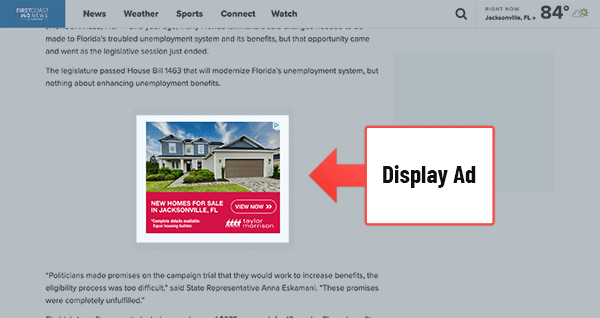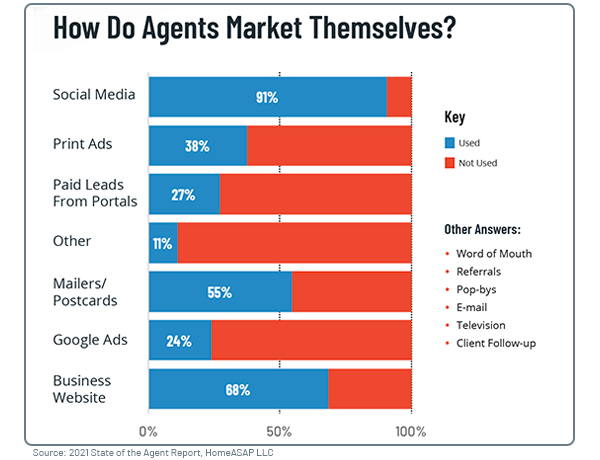How Will Apple’s App Tracking Changes Affect Real Estate Agents?
The fight between Facebook and Apple has been making national headlines. As a real estate agent, you may be tempted to think, “This has nothing to do with me,” but that’s simply wrong. Privacy concerns are changing technology, and even if you don’t use the Internet to market yourself, your competitors do. Agents everywhere need to be ready.
In this article, we’ll explore how privacy concerns are changing the Internet and the impact it will have on real estate. Plus, we’ll share how informed agents are adjusting their strategies for this shift.
Jump to a Section
Why Has Privacy Become an Issue?
As you have probably heard, technology companies know a lot about you. Thanks to special codes installed on sites around the Internet, they can track your interests, behaviors, and more to market more effectively to you. This fact probably doesn’t surprise you when you’re on sites like Amazon, Facebook, or Google.
What might surprise you is that these tech giants have access to data from other sites they don’t own as well. Similarly, this information gets used to send you relevant ads on sites and apps beyond just Amazon, Facebook, and Google. These ads can follow you across the Internet using a unique identifier tied to you.

This display ad was shown on a news website after the user visited a page about real estate.
Plus, this data gets used for more than just ads. Companies use this information to target and trigger emails as well as SMS text messages and even streaming recommendations. The more the public has learned about all the information that tech companies have, the harder they have pushed for changes and transparency.
How Are People Responding To Tracking Concerns?
Lawmakers have taken notice of the privacy concerns, too. In 2016, the European Union passed a law called GDPR which has become the blueprint for privacy laws in the US. Among other things, GDPR required businesses collecting personal information, such as email addresses, to protect and be transparent about what data they collect. Similar laws have been passed or proposed in California, New York, North Dakota, and several other states.
In 2020, Congress asked executives from Facebook, Google, and Apple to testify before a House committee on a range of topics including privacy. Since that hearing, both Facebook and Google have been hit with antitrust lawsuits, and big tech faces pressure from lawmakers to strengthen privacy protections.
As a result, tech companies are making big changes. Google has promised to end third-party tracking cookies in its internet browser, Chrome, and is experimenting with technology that tracks anonymous groups of people instead of individuals. Likewise, Apple made changes that will require users to opt-in to allow apps to track them.
Why Does the Push For Privacy Matters to Agents?
You may still be wondering how this affects real estate agents, but don’t forget that the internet serves as an important source of clients in today’s real estate market. According to our State of the Real Estate Agent report, over 91% of agents use social media for marketing, and 24% of agents use Google ads. Plus, nearly every agent uses e-mail to nurture leads and communicate with clients.

Data taken from the 2021 State of the Real Estate Agent Report.
The changes to these major platforms trickle down to the agent, too. In the future, tech companies will have less ability to follow users off of their platform. For instance, right now Google can trigger an agents’ ad for a user that Google knows has been looking at houses, but in the future, Google may have to make an educated guess about which users should see those ads instead.
The push for privacy also reveals a lot about the mindset of potential clients on the internet. Consumers are wary, and real estate agents need to be aware of how they present themselves now more than ever. An agent’s lackluster Facebook page or incomplete Google business listing can turn off a consumer because it lacks professionalism and undermines trust.
How Will These Changes Affect Agent’s Online Advertising?
With this shift towards more privacy, how should you adjust your marketing strategy? First, we need to recognize that this shift will hurt some platforms more than others. In general, platforms that rely on off-platform tracking to gather information will be affected the most.
For instance, Google will no longer be able to gather info about what a specific person does on other websites. As a result, Google ads will probably be less precise in targeting people except for organic search ads. Google may no longer be able to display an ad when that person takes an action on another site. The same will hold true for retargeting on Facebook, but the Facebook platform has some key and unique advantages for real estate agents.
Unlike Google, people spend a lot of time on Facebook liking and commenting about things that interest them, and Facebook can still use that information to deliver relevant ads. Facebook also owns Instagram, which can be used similarly. Facebook can use lead forms and Messenger to facilitate lead capture, too. Best of all, ad prices are expected to go down as advertisers adjust their ad strategies, so ironically there may be no better time to try Facebook ads.
How Should Agents Respond to Privacy Concerns?
As we move into an era of privacy-conscious technology, agents will need to take a few steps to ensure they’re ready.
- Create trust with professional-grade online assets.
Today’s wary consumers do their research, so you want to make sure that your potential clients will find complete and professional-quality digital assets including a Facebook business page and a Google Business Profile listing. -
Be transparent with how you will use the information you collect. When capturing lead information you should let people know how you plan to use their information and include a link to a Privacy Policy. If using tracking cookies on your website, many states will require you to notify users that you use cookies (usually in a pop-up).
- Make your information easily accessible.
As we’ve already said, success in marketing online depends on creating trust, and so your name and contact information should be easily accessible whenever possible. For instance, you can clearly see the agent information at the top of the Home Value Leads Tool landing page below.
Agent contact information is prominently displayed on this Home Value Leads Tool landing page.
- Prioritize Facebook and search ads.
With new and upcoming restrictions on third-party tracking, agents should prioritize platforms with access to in-app info that can be used for targeting, such as Facebook. Google search ads can also be a good option since you can use search terms to target people looking for a home, but expect to pay more for search ads.
Future Impacts of Privacy on Real Estate
While marketing technology may face big changes, it’s not necessarily a bad thing. Trust has always been important to the relationship between real estate agents and clients, and most agents already maintain high standards for privacy. The coming changes will serve to hold that same high standard to advertisers outside of real estate, and that creates a huge opportunity for agents.
Sectors like consumer products currently eat up lots of ad inventory with retargeting ads, but they will likely lose their value in the future. Just like with housing, an increase in ad inventory will most likely drive down ad prices. In fact, experts predict that Facebook stands to lose up to 7% of its total ad revenue as impacted advertisers reassess their ad spend under the rules.
In the end, the push for privacy may be a win for consumers and ethical real estate agents alike. However, agents need to be in the game to reap the benefits of a level playing field. Change is inevitable, but great agents will learn to adapt and thrive.
Popular Articles
House Flipping: Tips from the Experts
House flipping is a real estate investment strategy that has caught the attention of entrepreneurs and real estate enthusiasts. To succeed in house flipping, investors must find properties with hidden potential that they can transform through smart and strategic...

Virtual Home Tours on Social Media: Tips for Success
Property agents know that the key to a successful sale is often hosting an open house. Traditionally, open houses have been in-person events held at the property, and therefore subject to limited flexibility to cater to the busy combined schedules of owners, agents...

Creating Calls to Action for Real Estate
Picture this. You've finally got homebuyers' attention with an amazing Facebook post. They click the link to your Facebook business page. They're instantly impressed with the beautiful cover image and your professionalism, and yet nothing else happens. Your potential...

5 Ways To Leverage Property Data In Real Estate Marketing
Not so long ago, the bulk of decisions made within the real estate industry relied heavily on anecdotal information and gut feeling. Not surprisingly, some of these decisions didn't hit the mark and proved costly. These days, thanks to big data and advanced data...
Special Report: State of the Real Estate Agent 2021

In this special report, we unveil the truth about how agents are handling the issues that affect them from Covid-19 to low housing inventory to iBuyers, and more.


